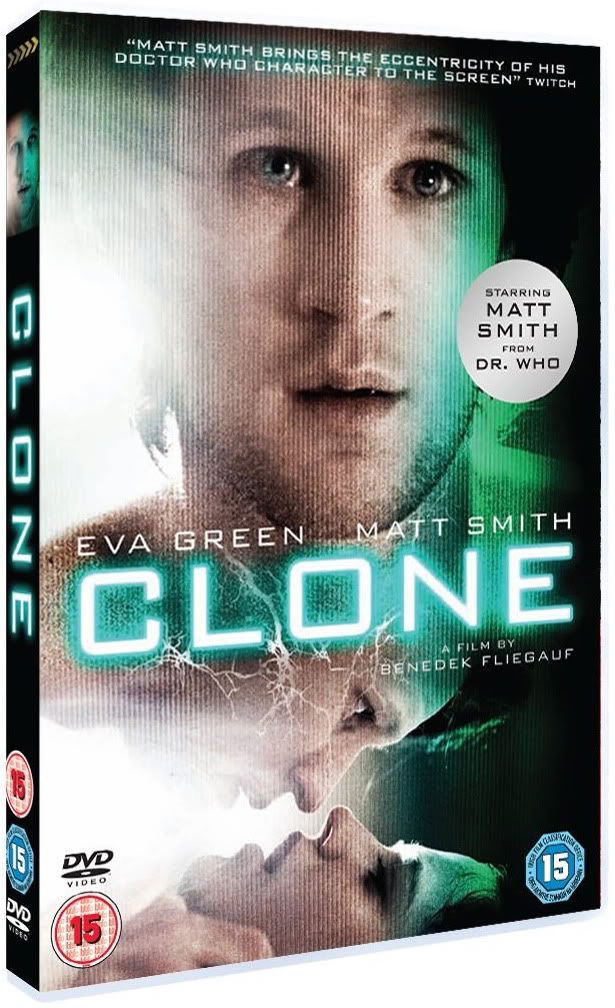Clone
Monday, 7 May 2012 - Reviewed by Matt Hills
 Written and directed by Benedek Fliegauf
Written and directed by Benedek FliegaufUK Release - 7 May 2012
Entertainment One
Available to purchase from Amazon UK
We follow the two lead characters, Tommy and Rebecca, from their childhood meeting through to their adult reunion. When Tommy (Matt Smith) is tragically killed, Rebecca (Eva Green) decides that she wants to bring him back, carrying and giving birth to his genetic replica. Curiously, while young 'Tommy 2' has time to grow up into Matt Smith all over again, the character of Rebecca barely seems to age across the same chunk of story. Perhaps copies age at a different rate to “originals”, but if so, this tangled timeline isn't quite made clear.
Fliegauf is the director as well as writer, and his visual style is rather languid, if not sometimes glacial. Clone couldn't really be described as a thriller; it runs at one pace – slowly – making repeated use of shots that are held for an extended length of time, as well as panoramic long shots where characters are dwarfed by the landscape around them. The latter makes for a self-consciously "beautiful" movie, and one where we're insistently reminded of the laws and the presence of nature. However, the former directorial choice is slightly more puzzling, since it means that Clone typically lacks any sense of urgency. For example, when Rebecca witnesses Tommy 1's death, we are shown Eva Green's reaction in a couple of drawn-out, unflinching shots that stress her real-time acting. But there's no gear change, no increased pace in editing and camerawork to indicate the tumult of events. And given that other sequences around this are also gently paced, there isn't enough sense of contrast and heightened drama at such a key moment. Instead, the film seems of a piece; consistently ponderous and detached in tone rather than visceral and vital.
Fliegauf also enjoys repeated, mirrored motifs: young Rebecca submerges her head under the bathwater, and later we see adult Rebecca emerge from seemingly the same bathwater. Young Tommy pulls his feet under the bedcovers; adult Tommy is then revealed to be in bed. Along with these playful transitions, a couple of key images linger in the memory, perfectly capturing the theme of a refusal to let go. Young Rebecca keeps a half-eaten, browning, shrivelled pear from her first meeting with Tommy, while Tommy preserves the pet snail in a matchbox that he'd intended to give to his sweetheart all those years ago.
Matt Smith, in particular, turns in an outstanding performance, and it's hard not to share Tommy 2's dismay and disorientation at the story's eventual conclusion. Smith also engages in a wonderful bit of actorly business involving a salt shaker at one point, and there are many moments of childlike wonder and eccentricity that resonate with his reading of the eleventh Doctor. Of course, this is a role which isn't limited by the rules and regulations of Doctor Who, so as well as seeing Smith run naked into the sea, he also features in a sex scene with Eva Green – playing his social but not genetic mother – that asks the viewer to consider whether they understand this act as incest. Conceptually challenging, Clone is not always easily enjoyable, but it is genuinely thought-provoking in a way that perhaps too few contemporary films are.
Excellent actresses such as Lesley Manville and Hannah Murray are given relatively little to do, as it is the Rebecca-Tommy relationship which lies at the heart of Clone. And despite the fact that this title is being heavily sold via Matt Smith's involvement – it is his face which dominates the DVD/Blu-ray cover – he is not on-screen for long periods of the movie. In his absence, child actors cast by Fliegauf are consistently strong, especially Tristan Christopher as the young Tommy. Along with emphasizing Matt Smith's presence in its marketing, this film has also been retitled for sell-through release – shifting from Womb to Clone – presumably after it was felt that a conventional SF title would sell better to the intended audience. But given the importance of Rebecca's decision to give birth to her beloved, I think it is a very real shame that Arrow Films have fought shy of retaining the original title. Changing it somehow implies that there is something culturally unacceptable about naming the film after a basic, biological part of human reproduction without which none of us would be here at all. Instead, Clone is a far safer option, and it is ironic that a film bravely tackling awkward material has been lumbered with a bland title sharing none of its bravery, as if Fliegauf's movie has been replicated as a copy of itself.




